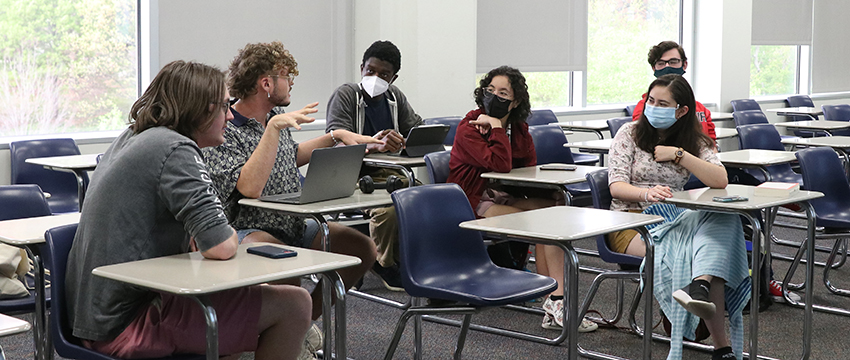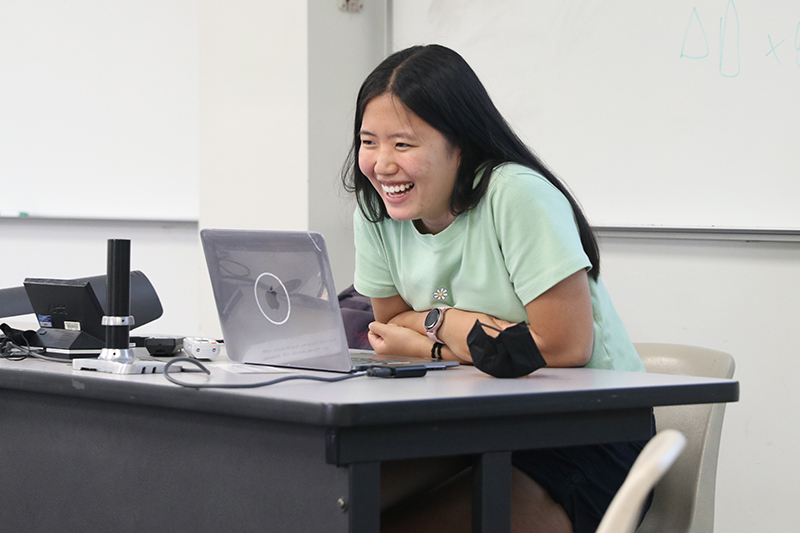The Writers’ Room provides collaborative experience for future screenwriters

The Writers’ Room provides collaborative experience for future screenwriters
The old adage “write what you know” applies to the students in The Writers’ Room, a group honing their craft as future television and screenwriters. While the group may not be professional yet, the students are creating a sitcom about a fictional college writers’ room.
The group of nearly a dozen students met most Mondays during the year in this collaborative writing club, a subset of the student-run club, The Industry.

The group was led this year by EMST major Sherry Liang who served as coordinator and motivator.
“This is hybrid learning,” Liang explains. “Learning how to write and actually writing.”
The students spent each Monday doing table reads and workshops where they would pitch ideas for the eclectic collection of characters…the hopeless romantic, the new guy, a teacher’s pet, the Eeyore (the one who is always dumped on)…and re-enact the episode that had been written since the previous meeting.
The group then discussed pros and cons of what was written, giving constructive feedback on tone, voice, style and sense of character. Suggestions are then given about topics like writing more concisely, thinking about how the ultimate angle the story is going to be viewed or providing a stronger sense of scene.
“Writing a single episode is much different than a standalone short script, explains Olivia Colburn, a second-year EMST student who just completed her first screenwriting class. “We must connect the episode to previous episodes, have a cohesive story in it of itself, and plant seeds for future episodes.”

Each week, one main writer is assigned to write the episode, and work with other club members to develop characters. All members then contribute ideas and suggestions during the meetings.

Derek Walker, a fourth-year EMST major, appreciates the collaborative nature and also the fact that he can pitch ideas and have fun.
“It’s ultimately a place where I can get out of my own head and relax,” Walker said. “It’s creatively rejuvenating, and I’m inspired to work more on my external projects.”
Another advantage, especially for students like Whit Pope, a first-year student, is that they can gain a lot of experience prior to taking their core EMST classes.
“It was daunting at first since I am only a freshman and had little to no scriptwriting experience, but I think the creative content mixed with the welcoming club atmosphere truly kept me coming back every week and made it a highlight of my semester,” Pope said. “I was also grateful for the advice from many older members who never stopped giving me such great pointers before taking an actual EMST course.”
While most of the advice focuses on character development and writing for the scene, technical input is also provided like the best software programs to use when writing.
Ultimately, the mission of The Writers’ Room is to provide a comfortable, supportive environment where students can flex their creative muscles. That is one of the reasons the group chose to write about a writer’s room this year.
“Everyone could contribute because everyone was in a college writer’s room and their niche experience would add color to the narrative,” concludes Walker. “Overall, I learned giving people a means of making the group project feel like their own brought out the best in everyone.”
The Writers’ Room students wrote nearly 10 episodes this season and are considering turning the script into an actual production for a web series next year.